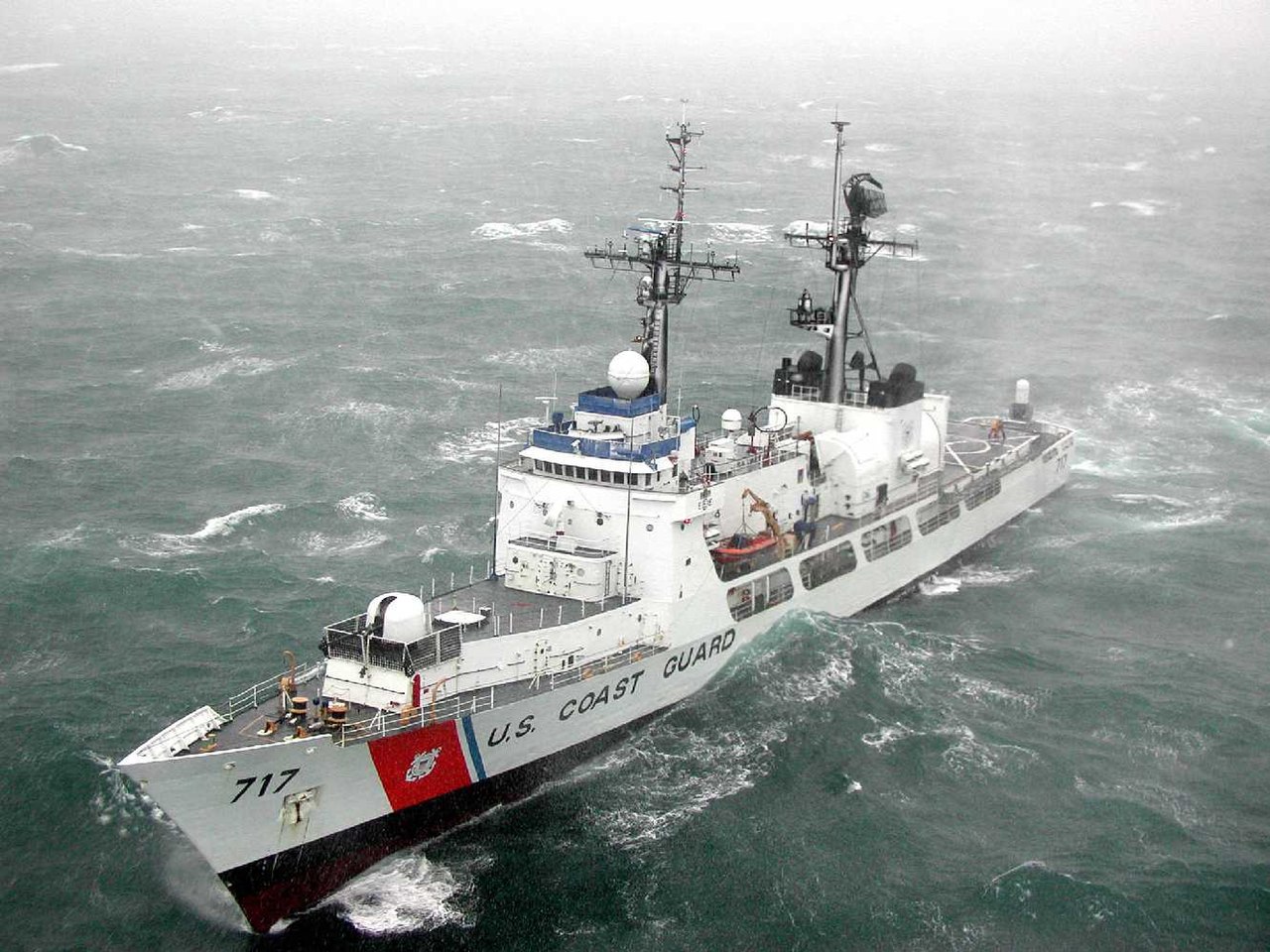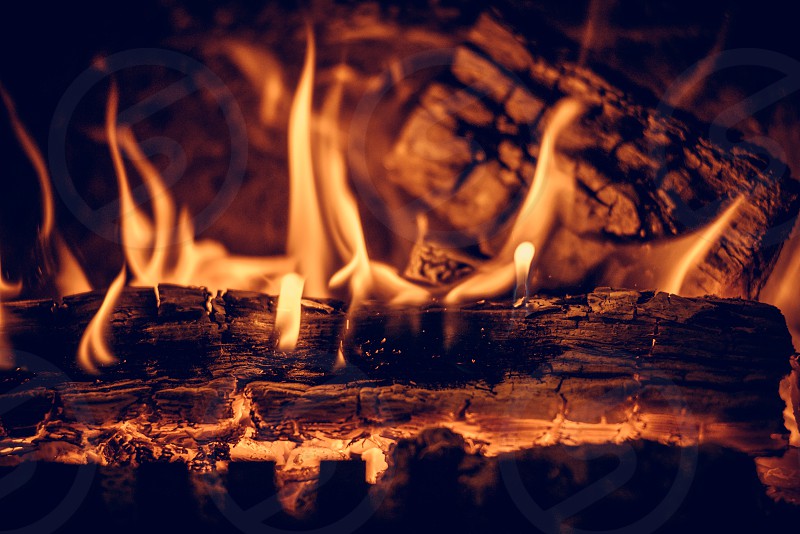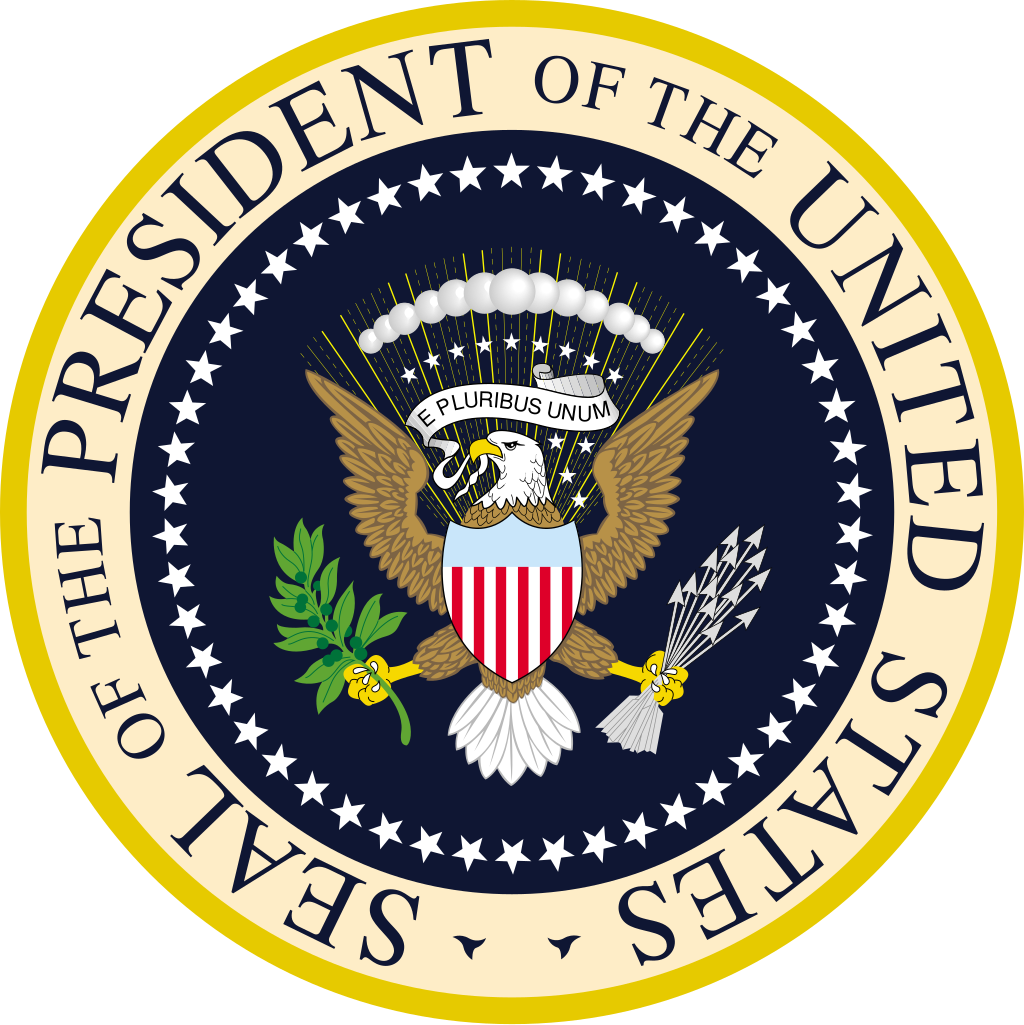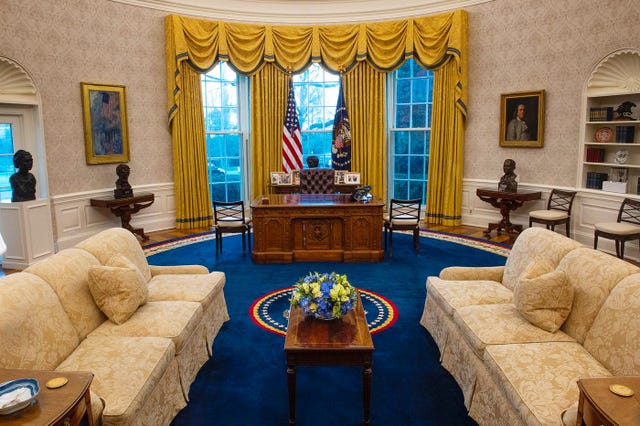- Jul 12, 2018
- 9,336
Special Agents Samuel Mason and Leonard Franklin stumbled down one of the corridors of the USCGC Munro as they made their way to the bridge. Franklin was doing just fine, but Mason wasn't looking his best. He was carrying his grey suit jacket and had loosened his tie. The ship lunged forward, and both of them just managed to hold on instead of falling forward into the steel wall before them. Mason dry-heaved as he clutched the wall.
"Don't close your eyes, lad," said the considerably older Franklin.
"If you're not use to the seas, it'll only make it worse," he said. Mason, who was a young man, grunted and did his best to keep his eyes open. While Franklin was walking behind him to make sure that his partner didn't keel over, in front of Mason was a Lieutenant who himself was doing somewhat better at keeping his balance.
"It's just ahead," said the Lieutenant who grabbed ahold of one of the massive steel doors and just barely managed to open it on his own. As he did so, the lights in the hallway shut off for a few moments, before being replaced by the dull illumination of red emergency lights. The bridge appeared to be the only part of the ship that still had normal lighting.
"Keep trying!" ordered the first officer to the communications officer.
"Aye aye, sir!" the communications officer responded. The coms officer put his hand onto the right ear of his headset, "Mayday mayday mayday, this is Coast Guard Cutter Munro, our radar and communications equipment is damaged. We are taking green water over the bow and have a fire in the engine room. Mayday mayday mayday, does anyone read? Over," he concluded. The sailor listened intently, waited a few moments and then repeated the message.
The Captain was looking through his binoculars when the Lieutenant that had been escorting the two men spoke up. "Captain, I have the Wickies!"
The Captain, who was in his 50s but was still junior to Agent Franklin and his trimmed white beard, set down his binoculars and looked at them. He braced himself on the blank console before him as they crashed into another wave.
"Engine two is down, our long-range communications seem as well as our primary radar. Martinez was taken to the infirmary, he hit his head," the Captain calmly said as he gestured over to a small table with a map on it, and some minor equipment around it. It appeared that Martinez was the navigation officer.
"Agent Franklin, you told me last night that you know navigation?" he asked.
"Yes, Captain," Franklin said, stabilizing himself on the console next to the Captain while Mason stumbled over to the signals officer. "Show me the code book," was all he could manage to say.
"Good," the Captain said. "Take Martinez's position. We're sailing blind right now, I need to know our current position... XO, sound general quarters," he said.
Franklin did so as ordered. He noted the last reported position by Martinez, and ignored the blood that was soaked into the upper right-hand corner of the map. He took into account their speed and direction, and then used the compass and protractor available to approximate where they were. Franklin did a few calculations, drew on the map, put his finger on the map, and then looked at Mason.
"Owls Head Light, what's the characteristic?" Franklin asked.
Mason flipped through the back of the codebook that the signals officer had produced. He took a few moments and then responded, "Fixed white, max distance is 16 nautical miles - there's no way we can miss it."
Franklin grabbed the binoculars that were strapped to the table used by the navigation officer and looked off the port side of the ship.
"Spotted!" he responded.
Franklin reported their position as 44°05'47.9"N 68°58'37.2"W. "Robinson Rock if four miles, dead ahead, Captain," Franklin said.
The Captain spotted the lighthouse himself with his binoculars as they rounded the top of a large wave, before crashing back down. That's when he noticed a goliath sized wave off of the left side of the ship.
"HARD TO PORT!" shouted the captain.
The helmsmen was already turning hard when the first officer repeated the order. The captain was handed the coms as everyone on the ship felt a hard jerk to the right, "This is the captain, brace for impact. Brace," he repeated, before himself bracing. The communications officer repeated the distress call over long-wave frequencies.
Over the course of the next minute, the cutter managed to turn to port just hard enough to make it almost directly into the massive rogue wave. Everyone on the bridge could hear the creaking of steal as the ship arched up at a 45 degree angle before bursting into the wave, water gushing over the windows of the bridge. The ship then tilted back flat momentarily, before jolting forward and heading back down the colossal wave. Several of the officers fell over or onto their consoles as everyone on board did their best to brace. The Munro eventually evened out on the other side of the wave, though she'd seen better days.
Before the captain could order a damage report the XO told him that there was a fire in the engine room. The fire response team was deployed as the communications officer continued to issue their distress call.
"Coms, try short-wave," the captain ordered as he stumbled over to Franklin, who was still manning his post. The captain asked for a repeat of the last weather report they received, observed the map, and decided to change their course to a North-West direction. This would bring them into West Penobscot Bay instead of the eastern route they had planned to get as close to the lighthouse as possible.
"Captain, that's not the course that'll get us to Dyce Head," Franklin said as the helmsmen made the correction.
"I'm well aware of that, Agent Franklin. If we steam ahead we'll make it to the eye of the storm. If the last weather report was right, it's going due East. Our best bet to get out of this and into calmer waters is to take that course, I'm not risking my ship anymore than I have to," he grumbled. It wasn't every day that he received his orders from the Commandant of the Coast Guard, but he knew that when those days came, they were nothing to be happy about.
"if we get to calmer waters, we can get you there by helicopter. If not, then we'll have to drop you off on land," he said as he kept an eye out for more rogue waves. After twenty-five minutes of sailing, the waters were just calm enough for them to launch the MH-65 Dolphin that was contained within the hanger of the ship. The weather outside was still abysmal, but apparently just well enough to launch the helicopter. Mason wondered if the captain just wanted them off of his ship, but Franklin countered that he wouldn't sacrifice the crew of his helicopter to get rid of a few "Wickies".
As the helicopter launched, Franklin and Mason could see two red lights on the mast were lit to indicate that other ships should stay clear. The windshield wipers on the helicopter went back and forth rapidly as they attempted to keep the snow and ice clear from the pilots field of view. Within twenty minutes, they could see the signature characteristic of Dyce Head, which was three beams of light followed by a brief darkness. "Thrice is Dyce" is how Mason had memorized it.

"We'll set you down, but we can't wait for you. Weather conditions are going to get worse," said the co-pilot to the two agents. Franklin and Mason acknowledged this as the helicopter set down just in front of the lighthouse. Outside were blizzard-like conditions with almost no visibility. The only thing that guided them to their destination were the powerful beams of light emanating from the beacon itself. The helicopter blasted off back into the sky and away from them, leaving the two men only with the howling sounds of the frigid winds. Mason made it to the door before Franklin and banged on the front door several times. After the ninth slam of his fist, the door opened, illuminating them with a blinding light. A long arm reached out and first yanked Mason inside, followed by Franklin. Mason fell onto the ground of the interior of the home, while Franklin stumbled inside. The door was slammed behind them. Mason, who was disoriented, first looked up at Franklin who had his hands in the air. He looked to his right and saw a tall man with white hair and fierce blue eyes pointing a flint-lock pistol at his partner.
"Who in the hell are you?" the man growled. Franklin didn't move a muscle, he'd been shot enough times in his life to know not to tempt fate. Mason, who was younger, gently gestured to his waste which was revealed. Pinned to his belt was a bronze badge that had an easily-visible lighthouse on it, and in engraving, "United State Lighthouse Service" on it.
"Federal Agents, U.S. Lighthouse Service. Are you Senator Sinclair?" Mason asked.
Sinclair relaxed his posture a bit, but kept his gun pointed in the general direction of the two men, "If you're here to seize my lighthouse, this isn't going to end well," he said.
"Sir," Franklin said in his gravely, old voice. He reached into his coat pocket, which made Sinclair aggressively pull back the hammer on the gun in anticipation of shooting. Instead of a weapon, Franklin pulled out a beige-colored envelope that had a wax seal on it. "This is from the White House."
"Don't close your eyes, lad," said the considerably older Franklin.
"If you're not use to the seas, it'll only make it worse," he said. Mason, who was a young man, grunted and did his best to keep his eyes open. While Franklin was walking behind him to make sure that his partner didn't keel over, in front of Mason was a Lieutenant who himself was doing somewhat better at keeping his balance.
"It's just ahead," said the Lieutenant who grabbed ahold of one of the massive steel doors and just barely managed to open it on his own. As he did so, the lights in the hallway shut off for a few moments, before being replaced by the dull illumination of red emergency lights. The bridge appeared to be the only part of the ship that still had normal lighting.
"Keep trying!" ordered the first officer to the communications officer.
"Aye aye, sir!" the communications officer responded. The coms officer put his hand onto the right ear of his headset, "Mayday mayday mayday, this is Coast Guard Cutter Munro, our radar and communications equipment is damaged. We are taking green water over the bow and have a fire in the engine room. Mayday mayday mayday, does anyone read? Over," he concluded. The sailor listened intently, waited a few moments and then repeated the message.
The Captain was looking through his binoculars when the Lieutenant that had been escorting the two men spoke up. "Captain, I have the Wickies!"
The Captain, who was in his 50s but was still junior to Agent Franklin and his trimmed white beard, set down his binoculars and looked at them. He braced himself on the blank console before him as they crashed into another wave.
"Engine two is down, our long-range communications seem as well as our primary radar. Martinez was taken to the infirmary, he hit his head," the Captain calmly said as he gestured over to a small table with a map on it, and some minor equipment around it. It appeared that Martinez was the navigation officer.
"Agent Franklin, you told me last night that you know navigation?" he asked.
"Yes, Captain," Franklin said, stabilizing himself on the console next to the Captain while Mason stumbled over to the signals officer. "Show me the code book," was all he could manage to say.
"Good," the Captain said. "Take Martinez's position. We're sailing blind right now, I need to know our current position... XO, sound general quarters," he said.
Franklin did so as ordered. He noted the last reported position by Martinez, and ignored the blood that was soaked into the upper right-hand corner of the map. He took into account their speed and direction, and then used the compass and protractor available to approximate where they were. Franklin did a few calculations, drew on the map, put his finger on the map, and then looked at Mason.
"Owls Head Light, what's the characteristic?" Franklin asked.
Mason flipped through the back of the codebook that the signals officer had produced. He took a few moments and then responded, "Fixed white, max distance is 16 nautical miles - there's no way we can miss it."
Franklin grabbed the binoculars that were strapped to the table used by the navigation officer and looked off the port side of the ship.
"Spotted!" he responded.
Franklin reported their position as 44°05'47.9"N 68°58'37.2"W. "Robinson Rock if four miles, dead ahead, Captain," Franklin said.
The Captain spotted the lighthouse himself with his binoculars as they rounded the top of a large wave, before crashing back down. That's when he noticed a goliath sized wave off of the left side of the ship.
"HARD TO PORT!" shouted the captain.
The helmsmen was already turning hard when the first officer repeated the order. The captain was handed the coms as everyone on the ship felt a hard jerk to the right, "This is the captain, brace for impact. Brace," he repeated, before himself bracing. The communications officer repeated the distress call over long-wave frequencies.
Over the course of the next minute, the cutter managed to turn to port just hard enough to make it almost directly into the massive rogue wave. Everyone on the bridge could hear the creaking of steal as the ship arched up at a 45 degree angle before bursting into the wave, water gushing over the windows of the bridge. The ship then tilted back flat momentarily, before jolting forward and heading back down the colossal wave. Several of the officers fell over or onto their consoles as everyone on board did their best to brace. The Munro eventually evened out on the other side of the wave, though she'd seen better days.
Before the captain could order a damage report the XO told him that there was a fire in the engine room. The fire response team was deployed as the communications officer continued to issue their distress call.
"Coms, try short-wave," the captain ordered as he stumbled over to Franklin, who was still manning his post. The captain asked for a repeat of the last weather report they received, observed the map, and decided to change their course to a North-West direction. This would bring them into West Penobscot Bay instead of the eastern route they had planned to get as close to the lighthouse as possible.
"Captain, that's not the course that'll get us to Dyce Head," Franklin said as the helmsmen made the correction.
"I'm well aware of that, Agent Franklin. If we steam ahead we'll make it to the eye of the storm. If the last weather report was right, it's going due East. Our best bet to get out of this and into calmer waters is to take that course, I'm not risking my ship anymore than I have to," he grumbled. It wasn't every day that he received his orders from the Commandant of the Coast Guard, but he knew that when those days came, they were nothing to be happy about.
"if we get to calmer waters, we can get you there by helicopter. If not, then we'll have to drop you off on land," he said as he kept an eye out for more rogue waves. After twenty-five minutes of sailing, the waters were just calm enough for them to launch the MH-65 Dolphin that was contained within the hanger of the ship. The weather outside was still abysmal, but apparently just well enough to launch the helicopter. Mason wondered if the captain just wanted them off of his ship, but Franklin countered that he wouldn't sacrifice the crew of his helicopter to get rid of a few "Wickies".
As the helicopter launched, Franklin and Mason could see two red lights on the mast were lit to indicate that other ships should stay clear. The windshield wipers on the helicopter went back and forth rapidly as they attempted to keep the snow and ice clear from the pilots field of view. Within twenty minutes, they could see the signature characteristic of Dyce Head, which was three beams of light followed by a brief darkness. "Thrice is Dyce" is how Mason had memorized it.

"Who in the hell are you?" the man growled. Franklin didn't move a muscle, he'd been shot enough times in his life to know not to tempt fate. Mason, who was younger, gently gestured to his waste which was revealed. Pinned to his belt was a bronze badge that had an easily-visible lighthouse on it, and in engraving, "United State Lighthouse Service" on it.
"Federal Agents, U.S. Lighthouse Service. Are you Senator Sinclair?" Mason asked.
Sinclair relaxed his posture a bit, but kept his gun pointed in the general direction of the two men, "If you're here to seize my lighthouse, this isn't going to end well," he said.
"Sir," Franklin said in his gravely, old voice. He reached into his coat pocket, which made Sinclair aggressively pull back the hammer on the gun in anticipation of shooting. Instead of a weapon, Franklin pulled out a beige-colored envelope that had a wax seal on it. "This is from the White House."
Last edited:










